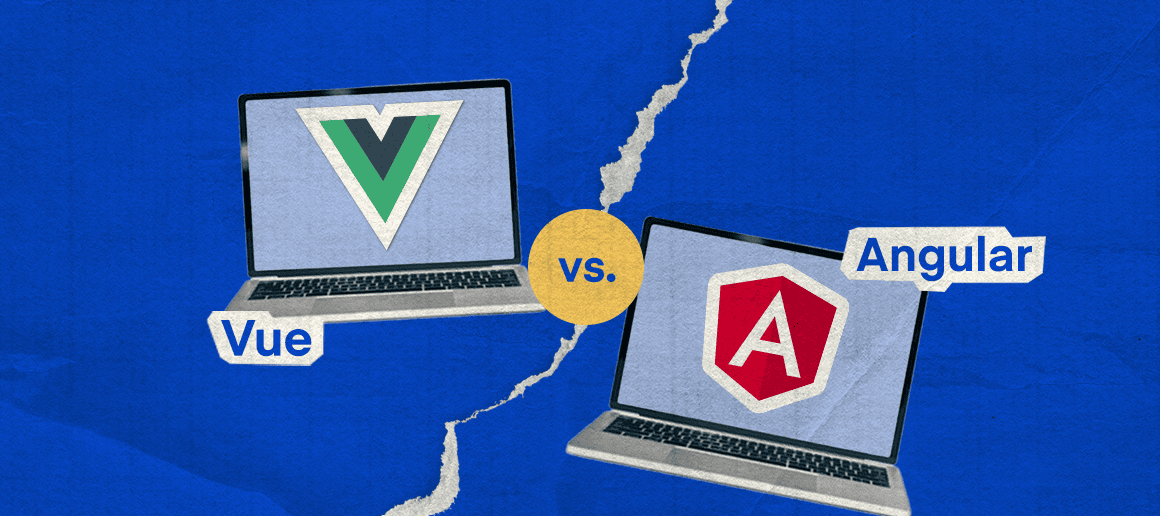Vue.js vs. Angular is a common deliberation amongst developers and business managers who have done some rudimentary research but genuinely don’t know which to pick.
Nowadays, building a sustainable website is almost entirely dependent on the aesthetic of your user interface (UI) – provided, of course, that you have the functionality to work alongside it.
Today web developers have the option to employ a variety of front-end frameworks to ease the development process.
But with so many options, what framework will help your business the most?
By extensively analyzing Vue.js vs. Angular, you should find that Vue.js carries a slight advantage of Angular. Take the opportunity to see the details of this analysis by observing how Vue.js and Angular compare in the following categories:
- Community
- Learning Difficulty
- Hiring Difficulty
- Scalability
- Rendering
- Performance & Speed
Stayed tuned for some in-depth information on both Vue.js and Angular, including an Angular vs. Vue.js side-by-side comparison!
Are you ready to start your development project?
We have the developers you need to take your development project in the right direction.
Companies are proven to grow their business faster with Trio.
Vue.js vs. Angular: Side-by-Side Comparison
Here is a good and thorough Vue.js vs. Angular side-by-side. Observe carefully how the two frameworks compare and contrast.

Community
Though Angular is backed by Google sponsorship, this makes no statement on its popularity or community size whatsoever.
Many developers may see a down-to-earth, community-driven framework like Vue.js to be more personal.
Startups, in particular, likely favor Vue.js over Angular as it serves smaller projects quite well.
In addition, both frameworks are based on JavaScript which has a justifiable surplus of web developers who may find solidarity in the language itself, instead of a single framework.
The Vue.js vs. Angular battle is tied here.
TL;DR: Stalemate.
Learning Difficulty
Vue.js is a downsized version of Angular. Therefore, simplicity was built into its core.
Angular, in contrast, has many tools that may come off as confusing and some syntax complexity as well.
Overall, Vue.js is easier to learn.
TL;DR: Vue.js wins.
Related reading: Vue.js vs. React: Which Is Better?
Hiring Difficulty
This is another place where Vue.js and Angular may meet their match.
JavaScript developers can range from the junior to senior level but the most professional of them make it their job to be overly familiar with the frameworks most fitting for development needs like you own.
There is no veritable evidence to show which and how many of these professional developers chose to learn one framework over the other.
Further, both frameworks are widely popular, so any estimation would show a negligent difference.
On the bright side, this means that you’ll have the chance to be picky with many professional JavaScript developers at your helm to develop your next project.
TL;DR: Stalemate.
Related reading: How to Hire Remote Developers
Scalability
Vue.js was built to be lightweight. But to use it accordingly, your application should be lightweight as well.
Although adding in complexity is well-supported for a progressive framework like Vue, there is a limit.
At the point where you reach this limit, Angular can scale you up.
And if you want to avoid switching frameworks in the future, then you should choose Angular front the start if scalability is a large concern.
TL;DR: Angular wins.
Rendering
Server-side rendering (SSR) displays web page content on the server rather than the browser on the client-side.
Subsequent interaction relies on fully rendered client-side data.
The effect of SSR has enhanced loading speeds that also boost SEO results as search engines have more information to crawl.
All that said, both Vue.js and Angular feature SSR.
TL;DR: Stalemate.
Performance & Speed
A big part of choosing the right tech stack is understanding the give and take nature of software comparisons.
You’ve just learned that Angular is more scalable than Vue. This should be a good thing, right?
It is. But since Vue.js is just so lightweight and small it’s capable of being extremely fast. That is, faster than Angular. Choose wisely.
TL;DR: Vue.js wins.
Other language comparisons that may interest you:
- Vue.js vs React
- Angular vs. React
- Flutter vs. React Native
- Xamarin Vs. React Native
Below you’ll find a deeper dive into Vue..js and Angular by observing the frameworks absent of comparison.
What Is Vue.js?
Vue.js is an open-source model-view-view model (MVVM) JavaScript framework.
MVVM is an architectural pattern that separates the graphical UI from the logic of the app.
The model contains the logic, the view contains the UI, and the view-model is where the two communicate. This enables two-way binding, making it easier than otherwise to handle HTML blocks.
The MVVM pattern includes HTML functionality and differs from the popular model-view-controller (MVC) architecture where the objective is a complete separation of concerns.
In this pattern, the model and view do not interact and the controller handles inputted data.
The framework is used for front-end development and is thus particularly suited for building user interfaces (UIs) and single-page applications (SPAs).
Its developers dub Vue.js ‘the progressive framework’ because you can start simple and add on features as you need for functional complexity.
That is, Vue.js is incrementally adaptable and its core library focuses only on the view layer.
Features of Vue.js
The most distinct feature of Vue.js is its directives. Vue.js directives are HTML attributes that allow developers to extend HTML and build functionality into HTML applications.
Directives work by directing libraries to manipulate a document object model (DOM) element. A DOM is simply an application programming interface (API) for HTML and XML documents.
APIs work as liaisons that help software interact with other software. In this case, Vue.js interacts directly with HTML applications.
Vue.js also offers some advanced features via officially maintained libraries like routing, state management and build tooling.
Routing permits the user to switch between pages without refreshing the page, easing navigation. This is done by moving packets of data from one source to another through network traffic.
State management is a general term referring to how different UI controls are managed, from text fields to OK buttons.
Build tooling or build automation is the process of automating the creation of an executable program.
Developers compile source code into binary and package it before deployment, resulting in more consistency overall for small projects.
Of course, Vue.js has many more features to offer. Once again, it is a progressive framework, designed for building from the ground up.
Keep in mind that when Vue.js was first developed in 2014 by ex-Google employee Evan You, it was an attempt to address the drawbacks of Angular.
The frameworks are similar, but Vue.js is noticeably lightweight.
The Advantages of Vue.js
No Vue.js vs. Angular comparison would be complete without carefully considering the advantages of each framework.
Go ahead and have a look at some of Vue’s principal benefits.

- Small
As established, Vue.js is very lightweight. The entire framework takes up at most 21 kilobytes on your computer.
You can download Vue.js in no time and build speedy applications right away.
- Easy
Vue.js is easy to understand with many high-level abstractions to simplify complex concepts. You can develop both small and large scale applications using Vue.
The out-of-the-box command-line interface (CLI) comes with a project generator where you’ll get a skeleton foundation for your project based on a few essential questions.
Then, developers can build up as they need, knowing they’ve saved time in the process.
Not to mention, any practiced web developer should already be familiar with JavaScript. A few lines of JavaScript and a sprinkle of HTML is all you need to get started with JavaScript.
The framework also supplies detailed documentation so you can write and execute your first application with the guarantee you’re doing it right.
- Simple
Web developers have the option of integrating Vue.js with existing applications.
Because Vue.js is fundamentally JavaScript, developers alter pre-existing JavaScript applications with Vue.js-based code in addition to building new web applications.
A Vue.js content delivery network (CDN) can be used to access components and libraries for simple integration without setting up Node.js or the Node Package Manager (npm).
Most developers opt for CDNs over npm to avoid spammy server requests when having heavy control over their package dependencies is not a huge concern.
- Flexible
Vue.js developers can write templates in HTML files, JavaScript files, or pure JavaScript files using virtual nodes.
Developers coming from different frameworks like Angular and React are sure to appreciate this flexibility.
Working with different tools like CSS or Typescript is also fairly simple with Vue.
When Is the Use of Vue.js Recommended?
Vue.js is used for front-end web development, particularly web UIs and single-page applications (SPAs).
SPAs are web applications that work largely with a web browser to mitigate data retrieval from the server. In doing this, SPAs don’t need to reload to present new information.
A couple of examples of SPAs are Facebook and Google Maps.
For web developers who like the idea of an open-source framework but also have a positive bias towards official support, they’ll be happy that some of Vue.js’s most relevant features are covered by official libraries.
Along with the core Vue.js module, there is a set of useful libraries to provide additional and often necessary functionality like vue-router for routing, Vuex for data management, and vue-cli to begin bootstrapping a new project.
Vue.js also implements virtual DOM (VDOM). VDOMs are practical alternatives to actual DOMS as a virtual representation of a UI can be kept in memory and synced with the actual DOM through reconciliation.
This method permits developers to make updates without having to replace the entire DOM at one time.
Which companies use Vue.js?
If you’re afraid to use a relatively new framework, rest assured that many businesses large and small have made great success with its implementation.
In fact, many major enterprises have trusted Vue.js.
Facebook is a social media site where users can share photos, videos, feeds, and much more with friends they choose to connect to online.
Now with over 2.7 billion monthly active users, Facebook goes above and beyond just social networking.
For example, Facebook’s News Feed has a tab for a marketplace where users can sell and buy items.
This part of Facebook was built with Vue, clearly showcasing Vue’s maturity for developing public-facing content.
- Netflix
Netflix is a streaming service. Using Netflix, users have a wide range of film and television series available to them with the convenience of a solid Internet connection.
It’s not hard to fathom why a site like Netflix would employ Vue. After all, Vue.js extends many reusable components like buttons, sliders, and checkboxes.
A quick search online and you can find a UI component emulating a Netflix slider, thanks to the work of Vue.js’s open-source community.
- Adobe Portfolio
Adobe is an American software company presenting the dedicated designer with numerous applications to build, edit, and design nearly anything you like.
The Adobe Portfolio is a tool for building custom websites. Ironically enough, its very infrastructure is built with Vue.js.
Related reading: 15 Companies That Use Node.js in 2025 Successfully
What Is Angular?
Angular is a TypeScript-based open-source framework for developing web applications. Developed by Google in 2010, Angular was completely rewritten in 2016.
Since its initial release, much of the core functionality has been moved to modules.
The first Angular – formally called AngularJS – was also based exclusively on JavaScript.
To compare, Microsoft’s TypeScript is a superset of JavaScript with features like static typing and annotations.
Static typing occurs when variables are checked at compile-time versus dynamic typing where type checking occurs at runtime.
The advantage of static typing only is that you can catch errors earlier on in the development process.
Type annotations denote when variables are declared with their data type.
After declaration, developers cannot change the value using a different data type other than what’s already been declared. This helps with catching bugs as well.
Rather than MVVM, Angular uses an MVC architecture which seems to be a preferred pattern amongst many developers and facilitates two-way data binding from model to view, unlike Vue.
This way, more complex development is more intuitive and comprehensive.
Given that Vue.js is based on Angular, you’ll see that Vue.js and Angular carry much of the same features, including HTML functionality and directives.
Of course, this makes the Vue.js vs. Angular conflict even harder to dissect.
For instance, both Vue.js and Angular use a template syntax that binds models to their respective views with HTML.
What Are the Advantages of Angular?
Before seeing a side-by-side comparison of Vu.js vs. Angular, you should see how Angular stands on its own virtual feet.
These are some of the advantages that garner widespread appreciation for the framework.

- Cross-Platform
Angular is cross-platform. You can build progressive web apps (PWAs), native mobile apps (with some assistance from Ionic, Cordova, or NativeScript), and even desktop applications across Mac, Windows, and Linux with Angular.
Take note that Vue.js has a cross-platform capacity as well. Except, you’d need to utilize Vue Native, its mobile framework counterpart, to actually build native mobile apps.
- Speed
Other than optimizing your code for modern JavaScript virtual machines, JavaScript supports lazy load.
Lazy load, also dubbed asynchronous loading, renders only the view a user requests, in turn for rendering everything at once.
- Productivity
Along with powerful template syntax, Angular is equipped with Angular CLI which – as with Vue.js – can be handy for building, testings, and deploying apps quickly.
Most web developers are also very keen on TypeScript. Its most serviceable features increase overall productivity.
- Sponsorship
Microsoft having contributed TypeScript to Angular and Google having contributed the entire project, this framework has notable corporate sponsorship.
Many developers see this as a major win in the Vue.js vs. Angular debate.
- Functionality
Like Vue, Angular has a CLI that comes with all your basics for web development.
It hides the complexity of Webpack and Babel so your developers can stay focused on coding.
By the way, Vue.js does this also.
When Is the Use of Angular Recommended?
You can use Angular for the same reasons you use Vue, but Angular is more complex.
Depending on your specific project this can be an advantage or disadvantage.
Angular is the default solution for commercial, enterprise applications. You can build large-scale projects with reusable and maintainable code using TypeScript.
Your business might also consider building a progressive web app (PWA).
For reference, PWAs are web apps that are built for mobile devices and featured as such.
With PWAs, you can obtain a native-like design and high-quality performance without your developers needing to program in a native language like Java or Swift.
Strategizing Angular with Ionic, Cordova, or NativeScript, you can even set out to make a mobile app.
Utilizing an efficient framework for back-end development like Node.js or a JavaScript wrapper like Electron, Angular can build desktop applications too.
Basically, Angular is a prime choice for any large-scale project where qualified front-end JavaScript developers can be of assistance.
Which Companies Use Angular?
It shouldn’t be surprising that many JavaScript developers would be excited to work with a framework that can improve the development process for everyone involved.
Many large companies just as excited about the opportunity have utilized Angular to their advantage.
- Gmail
Gmail is an email client and you can credit Google with its existence. Angular is technically a Google product so naturally they put it to work.
Various elements of Gmail’s user experience (UX) is due to Angular.
For instance, while loading Gmail for the first time may take several seconds, once loaded you can open in any email in any tab or category with no delay. Content can also be accessed offline.
Hangouts chats, which is a given on each Gmail account, is another feature of Angular.
These chats have live updates and can be integrated with other Angular apps.
- Forbes
Forbes is a website committed to sharing business-oriented news and information.
Through Angular functionality, those visiting the Forbes website can scroll eternally; they are presented with a new article near the end of each last article.
“Write once, use everywhere” is a niche platitude expressed by many framework developers.
For Angular, it is a statement emphasizing the reusability of the framework’s codebase no matter the device, operating system, or browser.
This was also a deciding factor as to why Forbes chose Angular.
- JetBlue
JetBlue is an airline known for its budget-friendly flight costs. When people book through the airline’s website, JetBlue must be able to handle extensive traffic all whilst welcoming visitors with an elegant UI.
JetBlue books and flies several million passengers each year. Needless to say, Angular has been successful with managing the outlined tasks.
Related reading: 12 Examples of Successful Companies Using React Native

Subscribe to learn more about Hiring
Conclusion
One important takeaway should be that when it comes to Vue.js vs. Angular, asking which is better is less of an important inquiry than asking which is best for your business.
Analyzing Vue.js vs. Angular differences has only demonstrated how similar the two frameworks really are.
But if your business needs scalability more than speed, for example, then Angular is a great vchoice.
Alternatively, if you plan on a small, lightweight, but highly functional project, then Vue.js might look more appealing.
After you’ve given your decision some thought, you’ll need to get started by hiring developers who can bring your project to the light.
At Trio, you can hire developers no matter what framework you choose – Vue.js or Angular. Click and learn more about how Trio can help you and your project.







